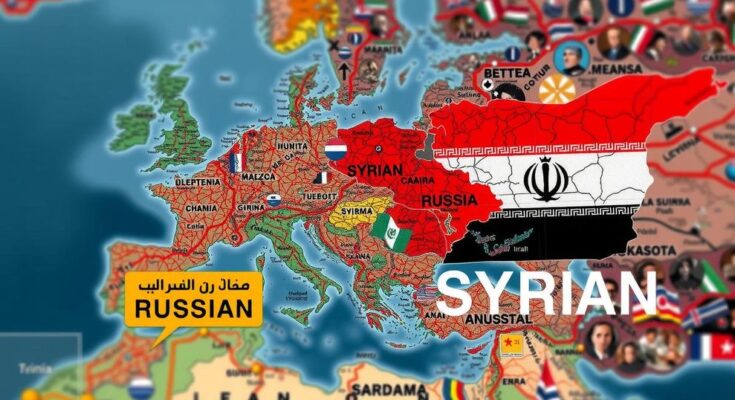The Syrian conflict is pivotal for Russia and Iran, with both nations supporting President Assad to maintain strategic control in the region. Russia’s military bases in Syria provide access to the Mediterranean and bolster its influence against the West. For Iran, Syria is essential for sustaining its proxy network, particularly in supporting Hezbollah. Recent escalations in conflict illustrate the ongoing significance of these dynamics, especially with global pressures affecting both powers’ capabilities.
Russia’s involvement in Syria intensifies as airstrikes target rebel factions threatening President Bashar Assad’s regime. The surprise offensive by the Islamist coalition, Hayat Tahrir al-Sham, marks a pivotal moment in the protracted civil war, holding significant ramifications for both Russian and Iranian interests. Moscow’s military presence in Syria, reinforced by critical military bases, is instrumental in ensuring its influence in the Mediterranean and beyond.
For Russia, Syria functions as a strategic foothold essential for projecting power into the Mediterranean and Africa. The Hmeimim airbase and Tartus naval base serve as vital assets for military operations. Experts emphasize that the loss of a pro-Russian government in Syria would undermine Moscow’s standing in the region, complicating its broader geopolitical ambitions. As Natasha Hall of the Center for Strategic and International Studies asserts, the maintenance of these bases is pivotal for Russian naval operations and influence in Africa, as well as fostering relations with other Middle Eastern powers.
On the Iranian side, Syria is equally critical as it provides Tehran with a direct land corridor to reinforce its proxy network, particularly the assistance to Hezbollah in Lebanon. This access enables Iran to sustain its military and logistical support for Hezbollah, especially vital given the heightened tensions with Israel. Steven Cook of the Council on Foreign Relations underscores that without Syria, Tehran risks losing a significant aspect of its strategic capabilities in the region, particularly in light of recent Israeli actions against Hezbollah.
Moreover, the historical backdrop of Russian support for Syria dates back to the Cold War, evolving into a robust military alliance under Putin. Following the onset of the civil war in 2011, Russia escalated its involvement, culminating in a direct military intervention in 2015. Despite the redirection of Russian forces toward the Ukraine conflict, the Syrian theater remains essential for Moscow’s international strategy.
Iran’s interests also encompass maintaining a foothold against adversarial forces as it navigates its own complexities within the region. Both nations’ diminished focus on Syria due to global tensions may leave openings for opposition forces, according to U.S. National Security Advisor Jake Sullivan. However, the potential fall of Aleppo would symbolically resonate as a significant setback for their aspirations, evidencing the fragile state of their ally even after years of military investment.
The ongoing Syrian conflict has drawn the attention and involvement of multiple global power players, particularly Russia and Iran, whose support for President Bashar Assad has shaped the battlefield dynamics significantly. Russia’s military presence, signified through established bases, is aimed at projecting its influence in the Mediterranean and counterbalancing U.S. dominance in the region. Similarly, Iran utilizes its Syrian foothold to bolster its proxy alliances, maintaining a strategic corridor to support groups like Hezbollah. This intricate geopolitical interplay underlines the stakes involved for both nations in preserving the Assad regime amidst the civil war’s turbulence.
The Syrian conflict continues to be a crucial pivot for both Russia and Iran, serving as a battleground for their strategic interests in the Middle East. As the conflict evolves, each country’s military support to the Assad regime underscores their respective agendas to retain influence in the region. However, the challenges posed by opposing factions and external pressures signify a precarious situation. A loss in Syria could critically undermine their projected image and geopolitical standing, raising imperative questions about the sustainability of their alliances.
Original Source: www.businessinsider.com




